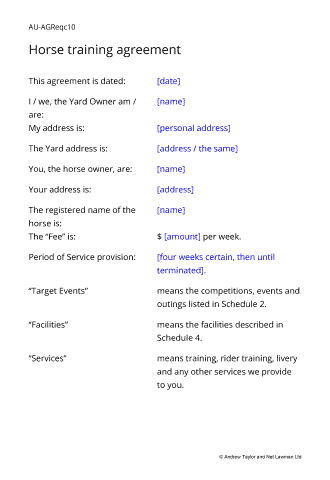Horse training agreement

Document overview

 ACT
ACT NSW
NSW NT
NT QLD
QLD SA
SA TAS
TAS VIC
VIC WA
WA

- Length:15 pages (3460 words)
- Available in:
 Microsoft Word DOCX
Microsoft Word DOCX Apple Pages
Apple Pages RTF
RTF

If the document isn’t right for your circumstances for any reason, just tell us and we’ll refund you in full immediately.

We avoid legal terminology unless necessary. Plain English makes our documents easy to understand, easy to edit and more likely to be accepted.

You don’t need legal knowledge to use our documents. We explain what to edit and how in the guidance notes included at the end of the document.

Email us with questions about editing your document. Use our Lawyer Assist service if you’d like our legal team to check your document will do as you intend.

Our documents comply with the latest relevant law. Our lawyers regularly review how new law affects each document in our library.
About this horse training agreement
Many horsemen simply agree to a training deal casually under the proposition that the owner will turn up from time to time for lessons on her ever-improving horse. It is easily done.
But that leaves you open to numerous potential problems. Without the terms of training written down, it is likely that at some point you will disagree with your client about exactly what level of service you are providing and what they should reasonably expect from you.
This agreement is your route to happier clients, an easier life and less worry about what might go wrong.
It protects you in a number of ways:
- By confirming the condition of the horse and whether it has any vices or problems, you will protect yourself from claims that the condition of the horse has deteriorated in your care. Failure to bring on a horse as quickly as the owner expects is also a common point of dispute.
- The agreement sets out the obligations of the horse owner too. Information she provides must be true and full. And if she just forgets to tell you that her horse will destroy your lorry, you have a neat provision that she will be paying the repair bill.
- The agreement also covers many aspects of what is included in your deal. If both sides know exactly what each other’s expectations and requirements are from the outset, the arrangement will be a success.
Disclaimers also include cover for situation when you are asked to ride a client’s horse on your land or anywhere else.
Who should use this document?
This document has been designed to be used by a professional horseman-trainer working with clients’ horses at his own stable or establishment.
There may be specialism in:
- Backing young horses
- Remedial training
- Bringing on inexperienced horses, perhaps giving competition experience
- Training lessons for the owner
However, the agreement is also suitable if you are taking a friend's horse as a one-off favour for a few months. Terms that seem excessive for your needs can be removed and guidance as to what you should leave is provided with the agreement.
This document protects the interests of the trainer first, but is fair to clients. The use of plain English throughout will remove any worry from your clients that they need are signing a document that they need a solicitor to check before signing.
The law in this horse training agreement
The law in this agreement is common law, so you can make the deal that suits both parties best. Either you can edit the agreement to be your terms and conditions (and use the same version for all customers) or you could edit this contract for each horse or pony you take.
Of course we take it for granted that you are aware of equine welfare issues, but they do not impact directly on your contract with the owners.
Document features and contents
The agreement includes the following provisions:
- Identification of the parties and the horse
- Warranties by the owner: statements by the owner that the horse does not have any vices or problems
- Obligations of the owner: towards using the stable and facilities, and towards the upkeep of the horse
- Training programme
- Use of facilities: terms governing when the owner can use the facilities
- Consequences as a result of failure to pay boarding and training fees
- Owner's indemnity
- Care and competition
- Disclaimers and limitation of trainer's liability
- Veterinary call out
- Termination of the contract
- Safety matters
- Other miscellaneous matters to protect your interest
Additionally, there are 3 schedules to the agreement that contain details about the horse and the service you will provide.

Recent reviews
Choose the level of support you need
Document Only
This document
Detailed guidance notes explaining how to edit each paragraph
Lawyer Assist
This document
Detailed guidance notes explaining how to edit each paragraph
Unlimited email support - ask our legal team any question related to completing the document
- Review of your edited document by our legal team including:
- reporting on whether your changes comply with the law
- answering your questions about how to word a new clause or achieve an outcome
- checking that your use of defined terms is correct and consistent
- correcting spelling mistakes
- reformatting the document ready to sign
All rights reserved
